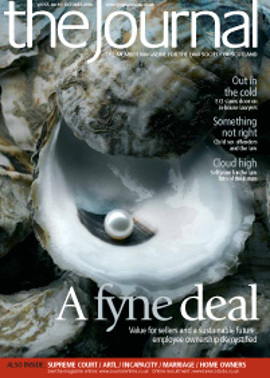Expensive business
Argument on the rights and remedies of landlords in relation to tenants in administration has so far been conducted in English courts. The Court of Session has now stepped into the debate, in Cheshire West and Chester Borough Council, Petrs [2010] CSOH 115.
Springfield Retail Ltd (“Springfield”) were tenants of the council for premises in Worcester. On 25 March 2008 administrators were appointed. They traded the business from the premises until 2 May 2008. On 19 May, they sold the business to Art Retail Ltd (“ARL”) and granted ARL a licence to occupy the premises (despite prohibitory provisions in the lease) until the earlier of (1) the date of a formal assignation of the lease; and (2) 18 November 2008.
This arrangement was intimated to the landlords’ agents after the event. The agents requested further information on ARL to enable them to consider the grant of the licence. No information was ever provided. No assignation of the lease was agreed. No executed licence was ever received by the administrators.
The licence provided that rent was to be paid by ARL to the landlords. None was ever paid.
On 20 November 2008, the administrators wrote to the landlords’ agents advising that the licence had terminated. In May 2009, the landlords changed the locks, bringing the lease to an end in English law.
The landlords then petitioned under the Insolvency Act 1986, sched B1, para 74, for an order for the administrators to pay all sums due in terms of the lease from 2 May 2008 until 1 April 2009 as an expense of the administration of the company.
No discretion
Lord Menzies in his opinion summarises the submissions made to him about the applicability of para 74 (which the administrators argued was misconceived); whether the court had a discretion about the rent being payable as an expense; and whether the landlords had suffered unfair harm to their interests. He held:
- 1. The application fell within para 74. It did not involve legal process or proceedings against the company or its property and therefore para 43 was not relevant.
- 2. Although attracted by the flexible approach adopted by the Court of Appeal in Atlantic Computer Systems [1990] Ch 505, in light of the House of Lords decision in Toshoku Finance UK plc [2002] 1 WLR 671 and the changes to the Insolvency Rules after the Enterprise Act 2002, there was no discretion to the court in deciding what was or was not an expense. In Scotland, rule 2.39B expressly adopts rule 4.67 (the liquidation expenses rule), and Lord Menzies therefore agreed with David Richards J in Exeter City Council v Bairstow [2007] 4 All ER 437 and Judge Purle QC in Goldacre (Offices) v Nortel Networks UK [2010] 3 WLR 171.
- 3. Although the administrators did not trade the business from the premises after 2 May 2008, they procured occupation of the premises by ARL until 18 November. This was part of the agreement for sale of the business and was therefore for the purposes of the administration.
Benefit of the administration
In Springfield, the administrators had sold the business trading from approximately 30 different premises for an aggregate consideration of £150,000. Payment of rent for the premises would substantially erode the funds available for the general body of creditors. The decision is however not surprising. It follows the line of English authorities suggesting that granting a licence to occupy premises in these circumstances is for the benefit of the administration, as it secures the sale of the business.
It does however leave unresolved the conflicting decisions of Goldacre, which holds that the administrators are liable for rent under the lease irrespective of the period or extent of their occupation, and Innovate Logistics [2009] BCC 164, where the licence had been granted on different terms to those contained in the lease, and the court held that it had a discretion as to the amount of rent payable to the landlord and required the administrators only to pay over that rent which they had contracted for and received from the licensee.
In many cases, discussion on an assignation of the lease will see the purchaser of the business attempting to negotiate a reduction in the passing rent which may cause the negotiations to founder; in such a case, it would appear, following Springfield, that the landlord will be entitled to the full contracted rent as an expense of the administration whether or not that rent is paid by the licensee. It would seem to follow that even if the licensee pays a lesser amount, the administrators will be liable for the balance and it will be in their interests as administrators to ensure that payment is made to them to avoid a substantial diminution in the value of the business sale.
Alistair S Burrow, Head of Recovery and Insolvency Team, Tods Murray LLP
In this issue
- The Scottish Government's EU and International Law Branch
- Akzo-Nobel: what you need to know
- The Edinburgh Declaration
- The curtailment of criminal appeals to London
- Society, justice and the greater good
- "We've aye done it this way" – not now!
- A deal to buy in to
- Land Register: what next?
- Designed to appeal
- Perpetrator or victim?
- An orchestra of instruments
- Two by two, by two
- Added capacity
- D-Day for legal aid
- Law reform update
- Compliance and the consent regime
- From the Brussels office
- Paper, pixel and process
- Ask Ash
- Draft proof
- Time for a fresh look
- Where to draw the line
- Reviewing the review law
- Expensive business
- Taking the full impact
- No discrimination?
- Scottish Solicitors' Discipline Tribunal
- Website review
- Book reviews
- It's not good to talk
- Getting to know you






